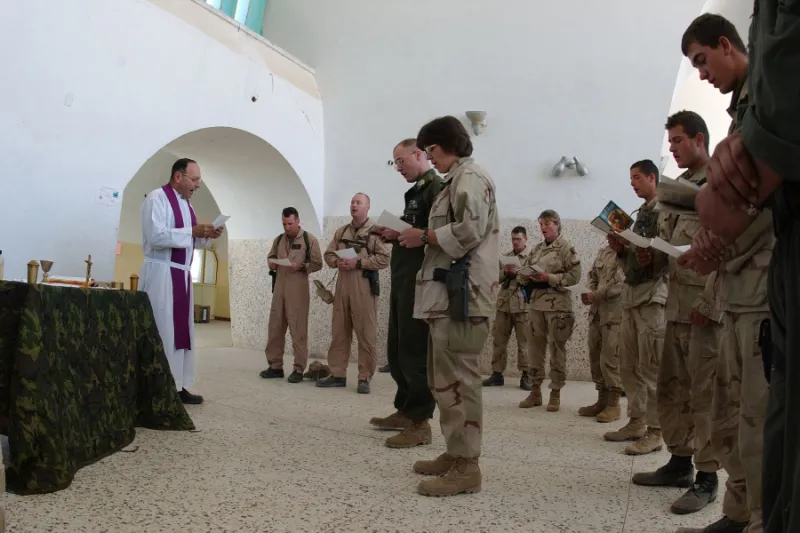
ACI Prensa Staff, Mar 30, 2024 / 07:00 am (CNA).
The term “transhumanism” has been gaining prominence in recent times, sparking debates about the future of humanity and the ethical implications of new technologies designed to modify the human body.
In a recent interview with ACI Prensa, CNA’s Spanish-language news partner, Argentine philosopher Mariano Asla, who holds a doctoral degree from the University of Navarra, offered a critical analysis of this controversial topic.
Transhumanism, Asla explains, is a scientific and cultural movement that proposes the “modification of human biology through the convergence of new technologies” such as nanotechnology, biotechnology, computer technology, and cognitive science. This convergence aims to “create a new species” in which the boundaries between the biological and the artificial “are completely blurred.” According to the philosopher, the aim is to make people “healthier, more intelligent, more empathetic, and have longevity.”
This idea of transcending human biological limits is not new. It dates back to Julian Huxley, who coined the term in 1957, raising the possibility of humanity evolving into a new way of existence.
A practical example occurred at the end of January when Neuralink, an American neurotechnology company owned by Elon Musk, implanted a brain chip in the first human patient, who was soon able to move his computer cursor by just using his mind.
According to its website, Neuralink’s mission is to “create a generalized brain interface to restore autonomy to those with unmet medical needs today and unlock human potential tomorrow.”
One of the main ethical challenges posed by transhumanism, according to Asla, is the impact it would have on all aspects of human life, from “reproduction and birth to social organization, including education, emotional life, work, and aging.”
By radically modifying the human body, Asla points out that there is a need to carefully analyze the possible benefits but also “the costs, risks, and possible unintended consequences.”
“For example, if in order to extend the longevity of some people it is necessary to experiment on healthy people and expose them to unpredictable risks that would not be morally permissible. Another common moral objection made to these proposals is the real possibility of generating an exponential increase in human inequalities, giving rise to elite social classes (the improved ones) and vulnerable and at-risk classes (the natural ones),” he warned.
According to the Argentine philosopher, the greatest challenge that transhumanism presents is to recover an adequate philosophy and theology of the human body and pointed to the legacy of St. John Paul II, which was “a step forward and an interesting source for a defense of what we are.”
Finally, Asla made reference to Pope Francis’ call to discern transhumanist proposals from an ethical perspective.
“Pope Francis has demonstrated, like the previous pontiffs, a genuine interest in responding to the challenges that our time presents. In dialogue with other voices and with the pastoral attitude of looking out to the peripheries, I believe that he invites us all to revitalize the Christian message, to seek new forms and new initiatives,” the philosopher said.
For Asla, this dialogue between the Christian faith and transhumanist narratives can enrich each other, but “it does not imply renouncing the truth (which does not belong to us, but has been revealed to us as a gift), but rather maintaining a sincere openness to everything that is beautiful and good that the world can offer us.”
“In short, the message of Christ is a profoundly divine and human message, which will never be outmoded and which should also illuminate the dialogue with transhumanist narratives,” he concluded.
This story was first published by ACI Prensa, CNA’s Spanish-language news partner. It has been translated and adapted by CNA.
If you value the news and views Catholic World Report provides, please consider donating to support our efforts. Your contribution will help us continue to make CWR available to all readers worldwide for free, without a subscription. Thank you for your generosity!
Click here for more information on donating to CWR. Click here to sign up for our newsletter.





Freedom. Freedom the impetus for Lucifer and Eve to become God’s free from God. As we abandon God and become our own decision makers, reflecting the concept of liberty, as formulated by justice Anthony Kennedy we escape any predetermined premises, guidelines inherited from tradition including natural law [this essay does not tell the reader precisely who it is from CNA Prensa that’s assessing Mariano Asla. Is it Diego Marina?].
Elon Musk’s development of brain chips for mental commands of technology has been expected since we’ve developed external technology for the handicapped to accomplish the same. The interviewer concludes his or her evaluation of Asla and transhuman technology from a Thomist perspective allows for modified development that theoretically remains within the framework of St Thomas’ anthropology. The problem as danger would be distancing from what it means to be human. Rightly identified as an ethics matter. The question is where in the swirl of technology does the human person divest their humanness. Humanness must be clearly defined within Christ revealed parameters.
Note. My reference to Saint Thomas Aquinas’ anthropology is taken from an abstract of Mariano Asla’s writings:
“Other authors, such as Nicholas Agar, propose a moderate enhancement that does not exceed the framework of what we understand to be human. In this article, I will offer a plausible interpretation of the project of human enhancement from a Thomistic perspective. To carry out my analysis, I will focus on three fundamental metaphysical and anthropological questions: How do advocates of radical enhancement understand the relationship between limits, imperfections and evils in human nature?” (Mariano Aslan. Abstract. On the limits, imperfections and evils of the human condition. Biological improvement from a thomistic perspective. Scientia et Fides).